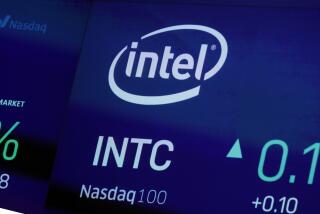Intel to Delay Merced Chip to Mid-2000
- Share via
Santa Clara, Calif.--Intel Corp. will delay its next-generation Merced computer chip by at least six months to the middle of 2000 because it needs more time to work out bugs in the complex microprocessor, the world’s largest chip maker said Friday.
The chip, designed for use in computer servers and workstations, was originally scheduled to debut in 1999. Analysts estimated the lost revenue to Intel at about $300 million, a pittance compared with the $25 billion it had in revenue last year.
Even so, the delay is the latest in a series of mounting woes for Intel, which has been wracked by falling personal computer prices, renewed competition, slumping demand in Asia and an expected complaint by antitrust regulators that it is unfair to competitors.
On top of that, investors have increasingly been looking to the Merced as Intel’s next engine for revenue and profit growth.
“This is certainly disappointing,” said Duane Eatherly, an analyst at Banc One Investment Advisors, which owns Intel stock. “This really impacts earnings power for 1999, and confidence will fall.”
Shares of Intel dropped as low as $70 in after-hours trading. In regular trading, they fell $2.06 to close at $71.44. The Merced delay was disclosed after the markets had closed.
Intel’s decision to delay the Merced will lift some computer companies and harm others.
Sun Microsystems Inc., which makes powerful servers and workstations, may benefit because the delay gives the company extra time to sell more of its $500,000 servers to companies that use its Solaris version of the Unix operating system, which competes with Windows NT from Microsoft Corp.
It also helps Digital Equipment Corp. push its Alpha chip, which is the most powerful available for workstations and servers. Intel’s delay could help DEC shore up market share before the Merced is rolled out.
For Hewlett-Packard Co. and Silicon Graphics Inc., the delay doesn’t bode well. HP is developing the Merced in conjunction with Intel and is banking on the Merced for its server strategy, analysts said. It also stands to lose revenue in its workstation business, where it’s the largest seller of the machines that run Intel chips and Windows NT.
“This is a minor blip on the radar screen,” said Jim Carlson, head of systems marketing for the Merced effort at HP. He said HP already has plans for its own internal chip development until 2002 to help customers make the transition to the Merced.
Drew Peck, semiconductor analyst at Boston-based Cowen & Co., was forecasting the Merced would bring in an additional $3.6 billion in revenue, based on 3 million units, and an average price per chip of $1,200.
But Intel won’t lose out on $3.6 billion because of the delay. It will make up for some of the revenue with an advanced, powerful Pentium II chip, code-named Xeon, which is due out by the end of June.
“Without Merced, the possibility exists we’re going to continue to see relatively heavy pricing pressure and more erosion for their average price per chip,” Peck said.
Barrett said the company made the decision to delay the Merced after Intel’s annual meeting last week. The company had problems in the so-called validation process, where engineers work out bugs in early versions of chips to make sure they perform well.
“Our best assessment is that the project is a bit bigger and complicated than we assumed it would be,” Barrett said. “We’re pleased with the progress. There’s not a basic problem with the technology.”
To be sure, the Merced is Intel’s most complicated and complex semiconductor chip since it got into the microprocessor business in the early 1980s. And Intel executives have taken pains to point out that the chip can crunch 64 bits of information simultaneously, double that of Intel’s current processors.
Intel may have opted to delay the Merced because of the weak PC market. PC growth is forecast to slow to 13% this year, down from earlier predictions of 17%. Japan, a key computer market, is still in a recession, and competition has heated up for Intel from smaller but scrappy rivals such as Advanced Micro Devices Inc. and National Semiconductor Corp.
“With PC prices collapsing, customers waiting for Windows 98 before buying any more PCs and Japan still a disaster, if Intel introduced Merced on time, it might actually cause the market to take a bigger dip,” said analyst Dan Hutcheson at market research firm VLSI Research.
An introduction in a weak market could compel Intel to drop prices on the chip soon after its introduction, something “you never want to do with your flagship product because you never really recoup the profits,” Hutcheson said.





